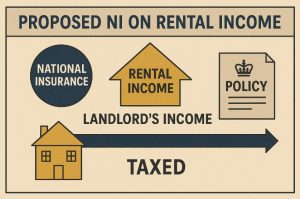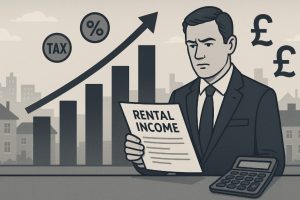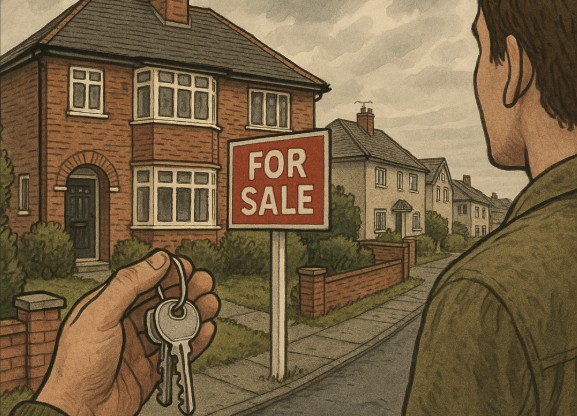As speculation mounts around Chancellor Rachel Reeves’ plans for the next budget, landlords across the UK are bracing for a possible shake-up.
Reports suggest that a new tax proposal could see rental income subjected to National Insurance contributions, a move designed to fill a significant financial gap in the public purse. But what could this mean for landlords, tenants, and the broader housing market?
What Is Rachel Reeves’ Proposed Tax Plan for Landlords?

Chancellor Rachel Reeves is reportedly preparing a policy that would see landlords pay National Insurance (NI) on rental income. Under the current tax structure in the UK, rental income is considered passive and not subject to NI contributions, unlike employment or self-employment earnings. The new plan would align rental income taxation with other forms of income, thereby increasing revenue for the Treasury.
According to reports, the Labour government is exploring the introduction of an 8% NI levy on rental profits. These profits are calculated after deducting allowable expenses such as mortgage interest, maintenance costs, and property management fees.
The following key points summarise the proposal:
- The tax applies only to net rental income, not gross income
- The proposed rate is 8%, similar to Class 4 NI paid by the self-employed
- The Treasury could generate approximately £2 billion annually
- The policy is intended to plug an estimated £40 billion deficit
The plan is seen by some policymakers as a way to increase fairness in the tax system by ensuring all forms of income are treated consistently. The proposal does not technically raise NI rates; it simply extends the existing structure to cover rental income.
Why Is the Labour Government Targeting Rental Income?
The Labour government’s renewed focus on taxing rental income stems from both fiscal necessity and a desire to reframe the UK’s approach to taxation in a way that aligns with its broader vision of fairness and economic balance.
With a significant funding gap estimated at up to £40 billion, Chancellor Rachel Reeves is under pressure to find sustainable and politically acceptable ways to raise revenue without violating Labour’s pre-election promises.
Upholding Fiscal “Red Lines”
Prior to the general election, Labour made a series of public financial pledges, often referred to as “red lines.” These include promises not to raise:
- Income tax
- Value Added Tax (VAT)
- National Insurance (NI) rates
These commitments were designed to reassure voters and the business community that Labour would not impose additional burdens on working families or interfere with consumer spending.
However, these limitations also restrict the Chancellor’s manoeuvrability when it comes to closing the nation’s budget deficit. In this context, expanding the NI base by applying it to income currently exempt, such as rental profits, becomes an attractive strategy.
Targeting Unearned Income
The core philosophy behind this proposed policy lies in the idea of tax fairness. Labour argues that the UK’s tax system is skewed in favour of individuals who earn income from capital, like landlords, over those who earn wages or salaries through employment.
Key distinctions between earned and unearned income in the UK:
| Type of Income | Currently Subject to NI? | Tax Treatment |
| Employment earnings | Yes | Income tax + National Insurance |
| Self-employment | Yes | Income tax + National Insurance (Class 4) |
| Dividend income | No | Dividend tax (lower rate) |
| Rental income | No | Income tax only |
Landlords are not required to pay NI contributions on rental income, regardless of the scale of their property portfolio. In contrast, an employee earning the same amount must contribute both income tax and NI. Labour believes that levelling this discrepancy can make the system more equitable.
Rachel Reeves and her advisors argue that this move does not breach Labour’s red lines, because it does not raise NI rates, but simply expands the types of income to which existing rates apply.
Ideological Alignment with Labour Values
Beyond fiscal considerations, the policy reflects Labour’s ideological commitment to social equity. By taxing rental income, Labour seeks to:
- Challenge wealth accumulation through passive income
- Address structural inequality in the housing market
- Reinforce the idea that those who benefit most from the economy should contribute more
This ideological stance resonates particularly well with segments of the electorate who feel the housing market has become unfairly tilted toward buy-to-let investors and property owners.
In recent years, rising house prices, stagnant wages, and limited housing supply have pushed homeownership further out of reach for many young people and low-income families. Labour’s tax proposal can be interpreted as a mechanism to rebalance the market and discourage speculation.
A Politically Calculated Move
The political calculus behind the policy is also worth noting. Taxing landlords particularly those with large portfolios is less politically risky than targeting wage earners or pensioners.
Landlords are often perceived in the public discourse as profiting from inflated rents and a broken housing system. This perception allows the government to frame the policy as a progressive reform targeting those who have historically benefited from favourable tax treatment.
The potential for public approval is high, especially among renters, first-time buyers, and younger voters. While opposition from landlord groups and property industry stakeholders is expected, the broader electorate may view the policy as overdue.
How Could the National Insurance Levy Affect Landlords Financially?

Landlords across the UK may see a significant drop in their rental income if the NI contribution is introduced. The impact will vary depending on the size of the landlord’s portfolio and their operating costs.
Estimated Annual Cost of 8% NI Levy on Net Rental Income:
| Net Annual Rental Income | Current NI Payment | Proposed 8% NI Payment | Difference |
| £10,000 | £0 | £800 | £800 |
| £20,000 | £0 | £1,600 | £1,600 |
| £35,000 | £0 | £2,800 | £2,800 |
| £50,000 | £0 | £4,000 | £4,000 |
For many landlords, this additional cost could result in:
- Lower net returns on property investments
- Rethinking portfolio size or selling underperforming properties
- Increased administrative complexity in tax reporting
Landlords operating on slim margins may be disproportionately affected. Additionally, this change could lead to restructuring strategies, including moving rental properties into limited companies to avoid NI exposure, though such a move brings its own legal and tax implications.
What Impact Could This Tax Raid Have on the UK Housing Market?
If implemented, the policy may influence landlord behaviour, which in turn could affect housing supply, affordability, and tenant security.
One of the most likely outcomes is a gradual reduction in the number of private landlords, especially among small-scale investors who rely on rental income as a supplementary revenue stream.
Potential market consequences include:
- An increase in property listings as landlords exit the market
- A short-term surge in supply, potentially easing buyer demand
- Long-term reduction in rental property availability
These changes might lead to greater market competition for buyers but could strain the availability of rental homes. Some experts argue that this could create a bifurcated market: more properties for sale, fewer for rent, and high rental competition in urban areas.
Will Rents Go Up If Landlords Face Higher Taxes?
A key concern from landlord associations and letting agencies is that rising tax burdens will translate into higher rents for tenants. The logic is straightforward. As landlords’ profits decrease, they are likely to raise rent to maintain margins.
Several factors will influence rent adjustments:
- Market conditions and rental demand in specific areas
- The supply of available rental properties
- How many landlords choose to pass on the cost versus exiting the market
However, the extent to which landlords can raise rents is capped by market limits. If tenants are unable to pay more, the result could be rising arrears or even increased evictions.
Could This Move Help More People Get on the Property Ladder?

The government argues that the proposed tax will encourage landlords to sell properties, which would then become available for first-time buyers. For years, housing advocates have argued that buy-to-let landlords have contributed to a lack of affordable housing, especially in major cities.
Potential Benefits for First-Time Buyers:
| Factor | Impact |
| Increased property listings | More choice for buyers |
| Lower investor demand | Reduced competition |
| Moderate downward pressure on prices | Increased affordability |
| Focus on ownership over rental | Policy shift toward homeownership goals |
If landlords release part of their portfolios, the resulting increase in housing supply could indeed assist younger and lower-income buyers who are currently priced out of the market.
However, this is contingent on several factors, including mortgage availability, interest rates, and buyer confidence. Additionally, if landlords only sell high-value properties or those in less desirable areas, the overall benefit to buyers may be limited.
Are There Alternatives to This Approach?
There are other policy tools that the government could use to raise revenue without impacting the private rental sector so directly. Some have argued that focusing exclusively on landlords ignores broader inefficiencies and imbalances in the UK tax system.
Alternative Measures the Treasury Could Explore:
- Reforming Council Tax to reflect property values more accurately
- Introducing a Land Value Tax that targets the value of land rather than property income
- Reassessing Inheritance Tax reliefs on property assets
- Enhancing enforcement of existing tax rules to reduce evasion
These alternatives may achieve similar revenue outcomes without distorting the rental market. However, they also come with political and administrative challenges.
Council Tax reform, for instance, would require cooperation from local authorities and may be unpopular in certain voter demographics.
How Are Experts and Politicians Reacting to the Proposed Changes?

The proposal has prompted a wide range of reactions. Some economists welcome the move as a long-overdue reform to equalise tax treatment across income types. Others argue it represents another burden on landlords, who have faced several legislative and tax changes in recent years.
Key Reactions:
- The Resolution Foundation has supported the idea, noting that income from work should not be taxed more than income from property
- Landlord associations such as the National Residential Landlords Association (NRLA) have warned of unintended consequences, including reduced housing availability and rising rents
- Some Labour MPs have remained cautious, focusing public statements on broader economic fairness rather than confirming the policy details
The Treasury has not made a formal announcement, and official confirmation is expected in the Chancellor’s autumn budget. Until then, both support and opposition are likely to intensify as the housing sector reacts to potential changes.
What Could This Mean for the Future of Buy-to-Let in the UK?
The buy-to-let sector has evolved significantly over the past decade. Regulatory pressure, changes to mortgage tax relief, and the introduction of stricter energy efficiency requirements have already squeezed profit margins. An additional tax burden may make buy-to-let less attractive, particularly to new or small-scale investors.
Long-term impacts may include:
- Consolidation of rental portfolios under institutional landlords
- Growth in the Build-to-Rent sector, particularly in urban areas
- Reduced competition among smaller landlords
- Increased professionalisation of the landlord sector
These shifts may bring both benefits and challenges. Larger operators may offer more consistency and compliance, but reduced competition could drive up rents and reduce tenant choice.
Conclusion
The potential Rachel Reeves tax raid on landlords is poised to be one of the most consequential policies for the UK property market in years.
Whether seen as a step toward tax fairness or a threat to housing stability, its impact will depend heavily on how the changes are implemented, and how landlords, tenants, and the wider market adapt.
With October’s budget on the horizon, all eyes will be on the Chancellor and landlords will be watching closely.
FAQs
What is the current tax rate on rental income in the UK?
Rental income is taxed as part of an individual’s income tax, after allowable expenses. Currently, landlords do not pay National Insurance on this income.
When will Rachel Reeves announce the proposed landlord tax change?
The changes are expected to be detailed in the upcoming autumn budget, scheduled for October 2025.
Can landlords avoid paying National Insurance on rental income?
If NI is applied to rental income, it may be unavoidable. However, some landlords may explore incorporating their property business, although this carries other tax implications.
How much could the government earn from this new landlord tax?
Estimates suggest the measure could raise £2 billion per year, with an 8% levy based on 2022–23 rental income figures.
What are the long-term consequences for the UK rental market?
The rental market may shrink as some landlords exit, potentially increasing rents and reducing availability, but also opening the market for buyers.
Is this tax policy aligned with Labour’s pre-election promises?
Labour pledged not to raise income tax, VAT, or NI rates. This policy skirts those red lines by applying NI to new types of income.
How will this impact first-time homebuyers?
If landlords sell properties, more homes could become available to buyers. However, prices and affordability will still depend on wider market conditions.






